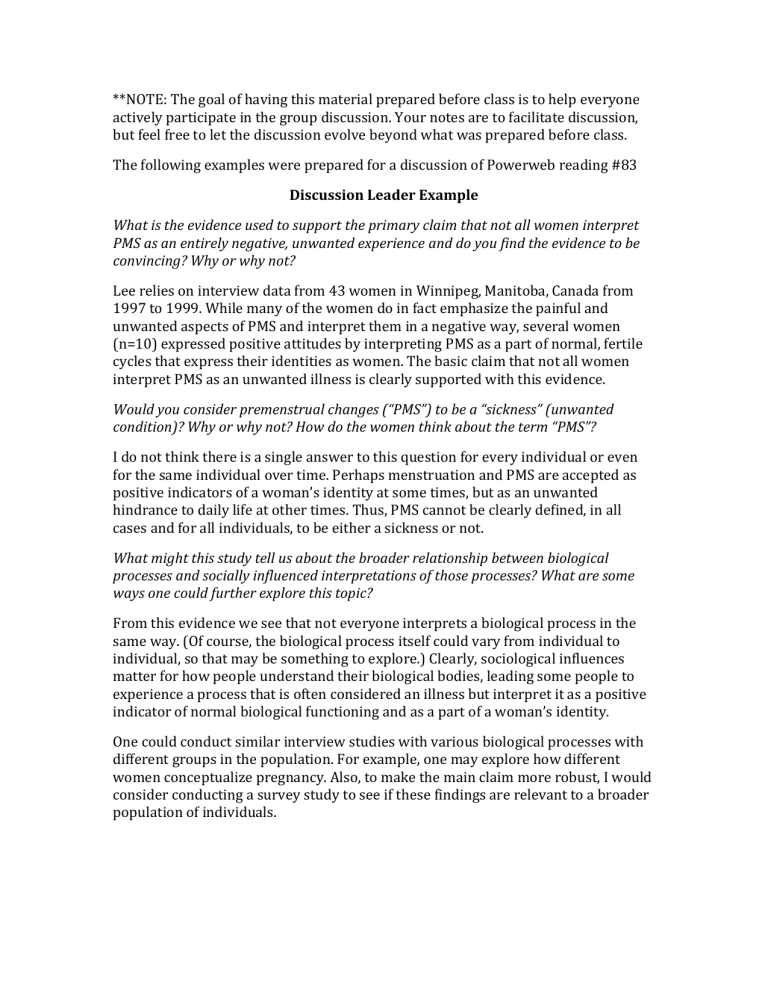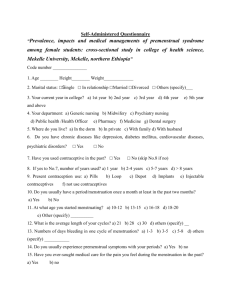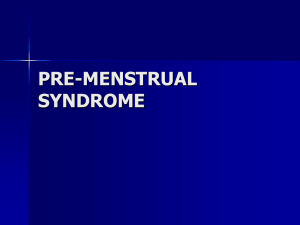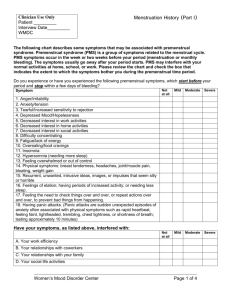Reading Group Example

**NOTE: The goal of having this material prepared before class is to help everyone actively participate in the group discussion. Your notes are to facilitate discussion, but feel free to let the discussion evolve beyond what was prepared before class.
The following examples were prepared for a discussion of Powerweb reading #83
Discussion Leader Example
What is the evidence used to support the primary claim that not all women interpret
PMS as an entirely negative, unwanted experience and do you find the evidence to be convincing? Why or why not?
Lee relies on interview data from 43 women in Winnipeg, Manitoba, Canada from
1997 to 1999. While many of the women do in fact emphasize the painful and unwanted aspects of PMS and interpret them in a negative way, several women
(n=10) expressed positive attitudes by interpreting PMS as a part of normal, fertile cycles that express their identities as women. The basic claim that not all women interpret PMS as an unwanted illness is clearly supported with this evidence.
Would you consider premenstrual changes (“PMS”) to be a “sickness” (unwanted condition)? Why or why not? How do the women think about the term “PMS”?
I do not think there is a single answer to this question for every individual or even for the same individual over time. Perhaps menstruation and PMS are accepted as positive indicators of a woman’s identity at some times, but as an unwanted hindrance to daily life at other times. Thus, PMS cannot be clearly defined, in all cases and for all individuals, to be either a sickness or not.
What might this study tell us about the broader relationship between biological processes and socially influenced interpretations of those processes? What are some ways one could further explore this topic?
From this evidence we see that not everyone interprets a biological process in the same way. (Of course, the biological process itself could vary from individual to individual, so that may be something to explore.) Clearly, sociological influences matter for how people understand their biological bodies, leading some people to experience a process that is often considered an illness but interpret it as a positive indicator of normal biological functioning and as a part of a woman’s identity.
One could conduct similar interview studies with various biological processes with different groups in the population. For example, one may explore how different women conceptualize pregnancy. Also, to make the main claim more robust, I would consider conducting a survey study to see if these findings are relevant to a broader population of individuals.
Creative Connector
This reading reminds me of Prof. DeLamater's point in lecture that there is a lot of variation in people. Some women experience menstruation negatively but others have a positive experience. What may lead one woman to perceive menstruation negatively whereas another may perceive it more positively? How does a woman’s culture influence her perception of menstruation? The sample of women interviewed for this study were Canadian, would women from different cultures answer the questions differently? Are certain cultures more likely to medicalize PMS?
In the textbook there is a discussion about influences on attitudes toward menstruation. One such influence has been the Bible, which describes a lot of taboos about menstruation. How do you think these taboos have influenced our perception of menstruation? Do you think these taboos have influenced the tendency to medicalize PMS?
Devil’s Advocate
1.
Do the authors establish a credible theoretical link between PMS and feelings of the menstrual cycle? What questions and evidence should the authors have included to more credibly analyze the relationship between PMS and menstruation?
In their question, methods, and conclusions they argue that there is a relationship between PMS and the menstrual cycle, but do they provide appropriate theoretical justification for the link between these? Rather than critically engaging with the relationship between PMS and menstruation, the authors continually reassert a connection between PMS, a “syndrome” or disordered state, with a natural cyclical process. As a result, their motivation for the article and their conclusions may be incomplete.
2.
The authors argue that women with extremely positive views were able to reframe their negative attitudes towards menstruation and distance feelings of PMS. This suggests a causal connection. Do the authors provide substantial evidence to justify a casual connection?
If the authors don’t provide substantial evidence, their claims should be adjusted to more accurately reflect the relationship. a.
If we want to get a better understanding of this relationship, what could the authors have included about participants? Why do the authors assume that particular categories such as age, education, marital status, and ethnicity will be important determinants of why women feel a certain way about menstruation? b.
Would it be more helpful to have a better understanding of degree of physical and social pain provoked by the period or the degree of symptoms experienced, how long they’ve been menstruating, what their cycle is like, whether they had children or not?
Would it be more appropriate to have a better understanding of how PMS symptoms have changed over time, and how views of menstruation have changed
Passage Master
Page 6: “The extremely positive women expressed concerns about the use of the term syndrome as it medicalized the changes and designated menstrual cycle variations as sickness…Referring to ‘changes’ rather than ‘syndrome’ may be an important step in the dismantling of the concept of PMS, as many women have mentioned that the label is loaded with contradictory meanings and ultimately serves to disempower women.”
Summary: For the extremely positive women, the medicalizing of a natural process,
PMS, may be disempowering. Menstruation is a natural process and as such, women in this study who are extremely positive feel that labels such as ‘syndrome’ are unnecessarily dramatizing PMS.
Importance: This passage illustrates one of the key findings of the paper, which is that for some, the term PMS serves to disempower women and refusal by the extremely positive group to accept the term for something that is natural to a woman’s body is seen as a form of resistance.
Page 7: “..the perception of menstruation as positive appears to be closely associated in this study with a feminist perspective. The importance of feminism in the lives and backgrounds of the extremely positive women provides a crucial component in the process of unraveling their attitudes toward menstruation and understanding its transformation….Women in the extremely positive group acknowledged that a feminist orientation had helped them deal with difficult issues in their lives.”
Summary: Women in the extremely positive group who were against the medicalizing of PMS often aligned themselves with a feminist perspective. These women also stated that having a feminist perspective helped them handle difficult situations in their lives.
Importance: This passage illustrates an important discussion point from this article.
The fact that women in the extremely positive group frequently aligned themselves with a feminist perspective illustrates that the finding that extremely positive women are against the medicalizing of natural body processes may have more to do with this alignment than their overall positivity.




